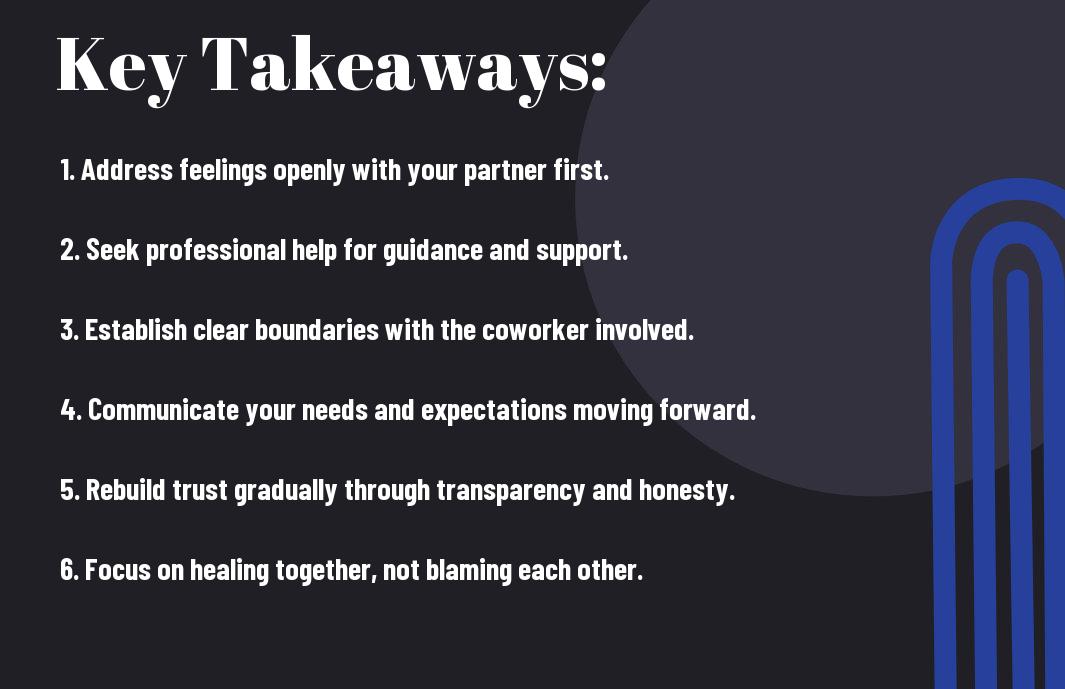Many couples face the challenging reality of navigating infidelity with a coworker. This situation can be particularly complex due to the shared work environment, making the path to repairing your marriage even more difficult. You may feel a whirlwind of emotions, but it’s crucial to focus on open communication and establish healthy boundaries. Understanding the dynamics at play, along with the necessary steps for healing, can significantly impact your relationship’s future. In this blog post, you’ll discover effective strategies to rebuild trust and strengthen your bond after such a betrayal.
Key Takeaways:
- Infidelity in the workplace can complicate marital relationships, requiring open communication to address issues effectively.
- Understanding the underlying reasons for the affair is imperative for both partners to heal and rebuild trust.
- Establishing boundaries between professional and personal life is important to prevent further issues in the relationship.
- Couples may benefit from seeking counseling or therapy to navigate the emotional aftermath of infidelity.
- Both partners should work on fostering emotional connection and intimacy to strengthen their bond moving forward.
- Honesty and accountability from the partner who cheated are necessary to restore trust and commitment.
- It is important to set realistic expectations for recovery time, as rebuilding a relationship takes patience and effort.

Understanding Infidelity
A deep understanding of infidelity is imperative for couples navigating the aftermath of betrayal. Infidelity can take many forms, including emotional and physical affairs, particularly when they involve a coworker. Recognizing the dynamics at play can help you address the intricacies of your situation and facilitate healing.
Defining Infidelity
Before tackling the issue, it’s important to define what infidelity means in your relationship. Infidelity may not always be just about physical encounters; it can also include emotional connections that compromise the trust and commitment inherent in a marriage. Clear definitions can help clarify the boundaries you both expect and need.
The Impact of Infidelity on Marriage
One of the most profound effects of infidelity is the erosion of trust, leaving deep emotional scars. It can lead to feelings of betrayal, anger, and sadness, not just for you, but for both partners. This breach creates a complex emotional landscape that necessitates open communication and mutual understanding to navigate.
Also, the impact of infidelity goes beyond immediate emotional reactions; it often redefines your relationship dynamics. The feelings of betrayal can manifest in increased anxiety, depression, and even lead to separation. However, overcoming infidelity can also present an opportunity for growth. Relationships may emerge stronger when both partners are committed to understanding and healing from the experience, fostering a deeper connection and renewed trust.
The Role of Coworkers in Infidelity
While it’s often said that the workplace is where many relationships begin, it can also be a hotbed for infidelity. The daily interactions and shared experiences with coworkers create an environment where emotional bonds can develop, sometimes leading to crossing boundaries. Understanding this dynamic is crucial if you’re navigating the aftermath of a partner’s affair with a coworker.
Workplace Dynamics and Temptation
By fostering a close-knit atmosphere, many workplaces inadvertently encourage intimate relationships among colleagues. Long hours spent together, shared stressors, and the camaraderie that arises can create opportunities for temptation, making it easier to blur the lines of professional decorum.
Emotional vs. Physical Affairs
Infidelity can manifest in various forms, primarily categorized as emotional or physical affairs. An emotional affair often seeks to fulfill unmet personal needs, prioritizing intimacy and connection over physical involvement. In contrast, a physical affair is characterized by sexual relations without that deeper emotional bonding. Both can cause significant harm to your relationship but understanding their distinct impacts is vital for healing.
It’s important to recognize that emotional affairs, while lacking physical intimacy, can be just as damaging as their physical counterparts. Often, you may feel betrayed not just by the act itself but by the emotional investment your partner has directed toward someone else. These relationships can lead to a deep psychological connection that can eclipse even the most intimate physical interactions, making it crucial to address both types of infidelity equally for effective healing and recovery in your marriage.
Initial Steps to Repairing the Marriage
After infidelity is revealed, the first steps to repairing your marriage involve establishing a plan of action. It is crucial to create a safe space for both partners where feelings can be expressed openly and without judgment. This foundation encourages healing, understanding, and rebuilding trust, which are vital for moving forward together.
Acknowledgment and Accountability
The journey to repair your marriage begins with acknowledging the impact of the infidelity. Both partners must take responsibility for their roles in the relationship’s current state. The unfaithful partner must admit their actions and express sincere regret, while the faithful partner should also reflect on the relationship dynamics that may have contributed to this situation.
Open Communication Strategies
Below are effective strategies to enhance open communication between you and your partner. Establish regular check-in times where you can discuss feelings, concerns, and progress without distractions. Use “I” statements to express your feelings and encourage your partner to do the same, fostering understanding and empathy. Set boundaries regarding conversations about the affair to ensure you both can find a clear path to forgiveness.
Even when emotions run high, implementing open communication strategies can pave the way for understanding and healing. Be honest about your feelings, allowing your partner to share their own. Regularly discussing your thoughts about the marriage can help identify recurring issues that contributed to the infidelity. Making a commitment to listen actively and validate each other’s emotions is crucial. Both of you should avoid blame games; instead, work towards finding solutions that can strengthen your relationship.

Seeking Professional Help
Unlike navigating the tumultuous waters of infidelity on your own, seeking professional help can provide a structured environment for healing. A skilled therapist can offer unbiased guidance, helping both partners express their feelings and work through underlying issues. Engaging a professional can also help you set the groundwork for rebuilding trust and intimacy in your relationship.
Couples Therapy
Around 70% of couples report improvements in their relationship after undergoing therapy together. In this safe space, you and your partner can openly discuss feelings of betrayal while developing strategies for communication and conflict resolution, fostering a deeper understanding of each other. A therapist can assist you in navigating the difficult path toward reconciliation.
Individual Counseling
Professional counseling can offer you a valuable opportunity to process your emotions post-infidelity. Individual therapy allows you to explore your feelings, understand the trauma of betrayal, and gain clarity on your desires and boundaries. As you engage in personal reflection, it’s vital to address any underlying issues that may have contributed to the infidelity, which can ultimately enrich your healing journey.
Individual therapy serves to strengthen your emotional well-being and equip you with imperative tools to handle the aftershocks of infidelity. It offers a private space where you can safely explore your thoughts and feelings without judgment. By working through your emotional pain and gaining insight into personal patterns, you can foster a sense of empowerment and resilience, facilitating healthier relationships in the future.

Rebuilding Trust
Despite the challenges that infidelity presents, rebuilding trust is crucial for the health of your marriage. It requires open communication, a willingness to forgive, and a commitment to making positive changes. You must actively participate in the journey to restore emotional safety, recognizing that your partner needs reassurance and validation as you both navigate this difficult path.
Steps to Restore Trust
For effective restoration of trust, you need to establish open communication, show genuine remorse, and practice accountability. It’s crucial to create an environment where both partners feel safe to express their feelings. Set clear boundaries together, and make consistent efforts to demonstrate reliability in your actions and words, solidifying your commitment to the relationship.
The Importance of Transparency
Below the surface of infidelity lies the need for complete transparency to rebuild a sense of safety in your relationship. Sharing thoughts and feelings openly can help bridge the gap caused by betrayal and create a pathway for healing.
Even after infidelity, a commitment to openness can transform your relationship. Being transparent about your feelings, daily activities, and interactions can help mitigate suspicions and foster trust over time. It’s important to engage in regular check-ins, where both partners can express concerns and celebrate progress. This practice not only strengthens your connection but also demonstrates that you are dedicated to rebuilding your marriage in a healthy, honest manner.
Moving Forward Together
Now that the emotional turmoil of infidelity has begun to settle, it is imperative to focus on healing and rebuilding your relationship. This process requires open communication and mutual understanding. You can gain valuable insights on healing by examining Coping with Infidelity: The 2 Stages of Pain, which outlines the phases many couples experience after betrayal.
Creating a New Foundation
With a commitment to turning your relationship around, it’s time to lay down a new foundation built on trust, respect, and emotional safety. You must engage in honest discussions about expectations and desires, fostering an environment that encourages vulnerability. It’s imperative to consistently check in with each other, ensuring that both partners feel secure and valued.
Setting Boundaries to Protect the Relationship
Beside communication, you must establish clear boundaries to safeguard your relationship from falling back into past patterns. These boundaries serve as guidelines that protect both partners’ emotional well-being and reinforce your commitment to each other. Establishing limits on interactions with others, especially the coworker involved, can help to build the trust that was lost and create a healthy space for your relationship to flourish.
Also, setting boundaries is about being proactive. Discuss what behaviors are acceptable and which are not. This includes limiting close interactions with the coworker and being transparent about your social engagements. Make it clear that you are prioritizing your relationship by avoiding actions that might be interpreted as disrespectful or secretive. Establishing these boundaries not only fosters a sense of security but also strengthens your emotional connection and provides a roadmap for a healthier future.
Conclusion
Hence, navigating the aftermath of infidelity involving a coworker can be complex and challenging. You must prioritize open communication with your partner to rebuild trust and address underlying issues in your marriage. Consider seeking professional help, such as couples therapy, to facilitate healing and foster a stronger connection. Reflecting on your own feelings and setting boundaries with the coworker is important for your emotional well-being. Ultimately, it’s about making informed choices that promote recovery and understanding in your relationship.
FAQ
Q: How can a couple begin to rebuild trust after infidelity with a coworker?
A: Rebuilding trust after infidelity, particularly involving a coworker, requires open and honest communication. Both partners must express their feelings, fears, and expectations. Establishing clear boundaries around communication with the coworker and demonstrating commitment to the marriage through actions can help restore trust. It may also be beneficial to engage in couples therapy to guide the process and provide support.
Q: What steps can the unfaithful partner take to show genuine remorse?
A: The unfaithful partner should actively acknowledge their actions and the pain caused to their spouse. Demonstrating remorse includes being transparent about interactions with the coworker and being open to discussing emotions. They should express a sincere desire to change and might consider creating a personal plan for self-improvement, which could encompass individual therapy or accountability measures.
Q: How should both partners address the emotional fallout of infidelity?
A: Both partners should prioritize emotional healing by allowing space for each to share their feelings. Regular check-ins can facilitate ongoing conversations about progress, worries, and feelings associated with the infidelity. Couples might also find it helpful to pursue individual therapy to process their emotions independently, helping to prevent resentment from building in their relationship.
Q: Can couples therapy be effective in addressing issues stemming from infidelity?
A: Yes, couples therapy can be very effective for couples dealing with infidelity. A trained therapist can help the couple communicate more effectively and provide tools to address underlying issues that contributed to the infidelity. Therapy creates a safe environment for both partners to express their feelings and guide them through forgiveness and rebuilding their relationship.
Q: What role does the workplace environment play in healing after infidelity?
A: The workplace environment can significantly impact the healing process. Both partners may need to set clear boundaries regarding interactions with the coworker involved in the infidelity. It is important for the unfaithful partner to minimize situations that could create tension or suspicion. Additionally, couples should discuss how they will handle workplace situations involving the coworker to avoid triggering past emotional pain, promoting a healthier workspace and home life.
